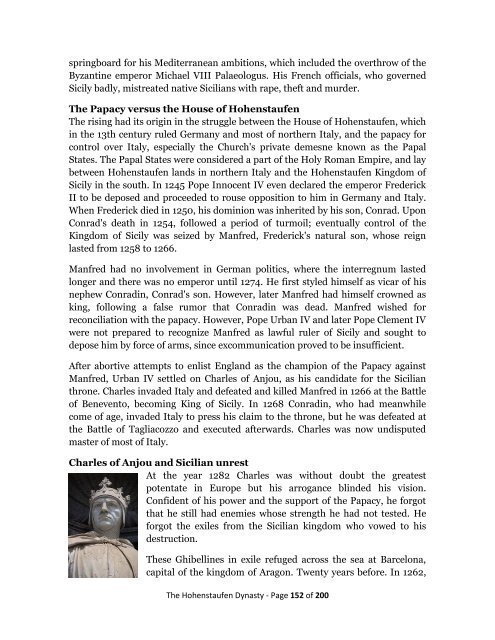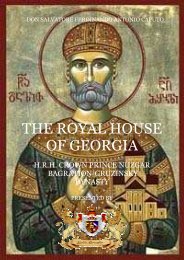here - Nobility Associations
here - Nobility Associations
here - Nobility Associations
You also want an ePaper? Increase the reach of your titles
YUMPU automatically turns print PDFs into web optimized ePapers that Google loves.
springboard for his Mediterranean ambitions, which included the overthrow of the<br />
Byzantine emperor Michael VIII Palaeologus. His French officials, who governed<br />
Sicily badly, mistreated native Sicilians with rape, theft and murder.<br />
The Papacy versus the House of Hohenstaufen<br />
The rising had its origin in the struggle between the House of Hohenstaufen, which<br />
in the 13th century ruled Germany and most of northern Italy, and the papacy for<br />
control over Italy, especially the Church's private demesne known as the Papal<br />
States. The Papal States were considered a part of the Holy Roman Empire, and lay<br />
between Hohenstaufen lands in northern Italy and the Hohenstaufen Kingdom of<br />
Sicily in the south. In 1245 Pope Innocent IV even declared the emperor Frederick<br />
II to be deposed and proceeded to rouse opposition to him in Germany and Italy.<br />
When Frederick died in 1250, his dominion was inherited by his son, Conrad. Upon<br />
Conrad's death in 1254, followed a period of turmoil; eventually control of the<br />
Kingdom of Sicily was seized by Manfred, Frederick's natural son, whose reign<br />
lasted from 1258 to 1266.<br />
Manfred had no involvement in German politics, w<strong>here</strong> the interregnum lasted<br />
longer and t<strong>here</strong> was no emperor until 1274. He first styled himself as vicar of his<br />
nephew Conradin, Conrad's son. However, later Manfred had himself crowned as<br />
king, following a false rumor that Conradin was dead. Manfred wished for<br />
reconciliation with the papacy. However, Pope Urban IV and later Pope Clement IV<br />
were not prepared to recognize Manfred as lawful ruler of Sicily and sought to<br />
depose him by force of arms, since excommunication proved to be insufficient.<br />
After abortive attempts to enlist England as the champion of the Papacy against<br />
Manfred, Urban IV settled on Charles of Anjou, as his candidate for the Sicilian<br />
throne. Charles invaded Italy and defeated and killed Manfred in 1266 at the Battle<br />
of Benevento, becoming King of Sicily. In 1268 Conradin, who had meanwhile<br />
come of age, invaded Italy to press his claim to the throne, but he was defeated at<br />
the Battle of Tagliacozzo and executed afterwards. Charles was now undisputed<br />
master of most of Italy.<br />
Charles of Anjou and Sicilian unrest<br />
At the year 1282 Charles was without doubt the greatest<br />
potentate in Europe but his arrogance blinded his vision.<br />
Confident of his power and the support of the Papacy, he forgot<br />
that he still had enemies whose strength he had not tested. He<br />
forgot the exiles from the Sicilian kingdom who vowed to his<br />
destruction.<br />
These Ghibellines in exile refuged across the sea at Barcelona,<br />
capital of the kingdom of Aragon. Twenty years before. In 1262,<br />
The Hohenstaufen Dynasty - Page 152 of 200



